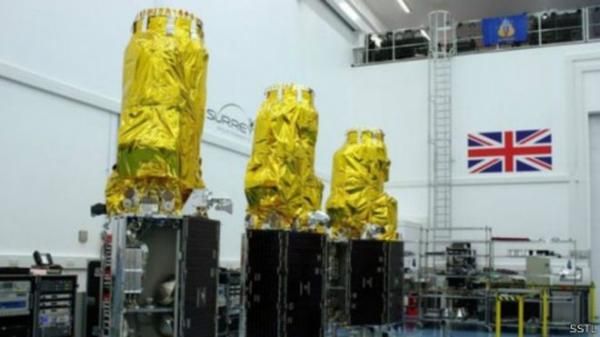News Center
China Focus: Sino-UK remote sensing satellite constellation launched
December 23, 2015
English.news.cn 2015-07-11 15:38:06

BEIJING, July 11 (Xinhua) -- Three one-meter resolution optical Earth observation satellites were successfully launched early Saturday, according to operator Twenty First Century Aerospace Technology Co. Ltd. (21AT).
The satellites, which will form the DMC3/TripleSat Constellation, were launched from a site in India as part of a Sino-UK cooperation project.
The satellites were developed by UK-headquartered Surrey Satellite Technology Ltd. (SSTL), which is the world's leading small satellite company and part of the Airbus Group.
21AT, a commercial Earth observation satellite operator based in Beijing, provided the imaging capacity of the three satellites and dubbed the Constellation "Beijing-2".
The Chinese company will manage the satellites' operation, including observation and control, and data reception and production, as well as related services.
Wang Zhiyong, 21AT deputy general manager, said Beijing-2 was a state-approved program and part of national civilian-use space infrastructure.
China has encouraged private investment to support the launch and operation of remote sensing satellites, and ground application systems for satellite navigation.
Industry observers heralded Beijing-2 as an important milestone in the involvement of the private sector, and the commercialization and international cooperation of the industry.
SINO-UK COOPERATION
The cooperative contract for the DMC3/TripleSat Constellation was signed in London in 2011.
The satellites' very high resolution imager was designed and manufactured by SSTL, and will provide one meter ground sampling distance (GSD) in panchromatic mode, and four meter GSD in multispectral mode.
The satellites, with a designed lifespan of seven years, provide the best combination of spatial resolution and time resolution -- which stimulates monitoring applications, such as urban planning and intelligent management, at a very high resolution.
Within three months of Saturday's launch, the three satellites will be 120 degrees apart around the same orbit using their on board propulsion systems, and the constellation will be able to target anywhere on Earth once a day, said SSTL, which has built and launched 47 satellites since 1981, "with an innovative approach that is changing the economics of space," according to its website.
Once the three satellites are fully operational, in three months, 21AT will start its data services, said Wang Zhiyong, adding that the constellation will offer a huge amount of data for sectors such as land resources management, farming resources survey, environmental monitoring and urban management.
21AT employs more than 300 staff and has been providing remote sensing applications in China since the launch of its first satellite -- Beijing-1 in 2005, part of China's key technological program. It extended its service to 2012, with its data service and products used in many fields and exported to more than 40 countries.
Beijing-1 is one of five satellites that had provided international disaster response to international customers.
Based on Beijing-1's success, 21AT acquired the three one-meter satellites for Beijing-2 service.
